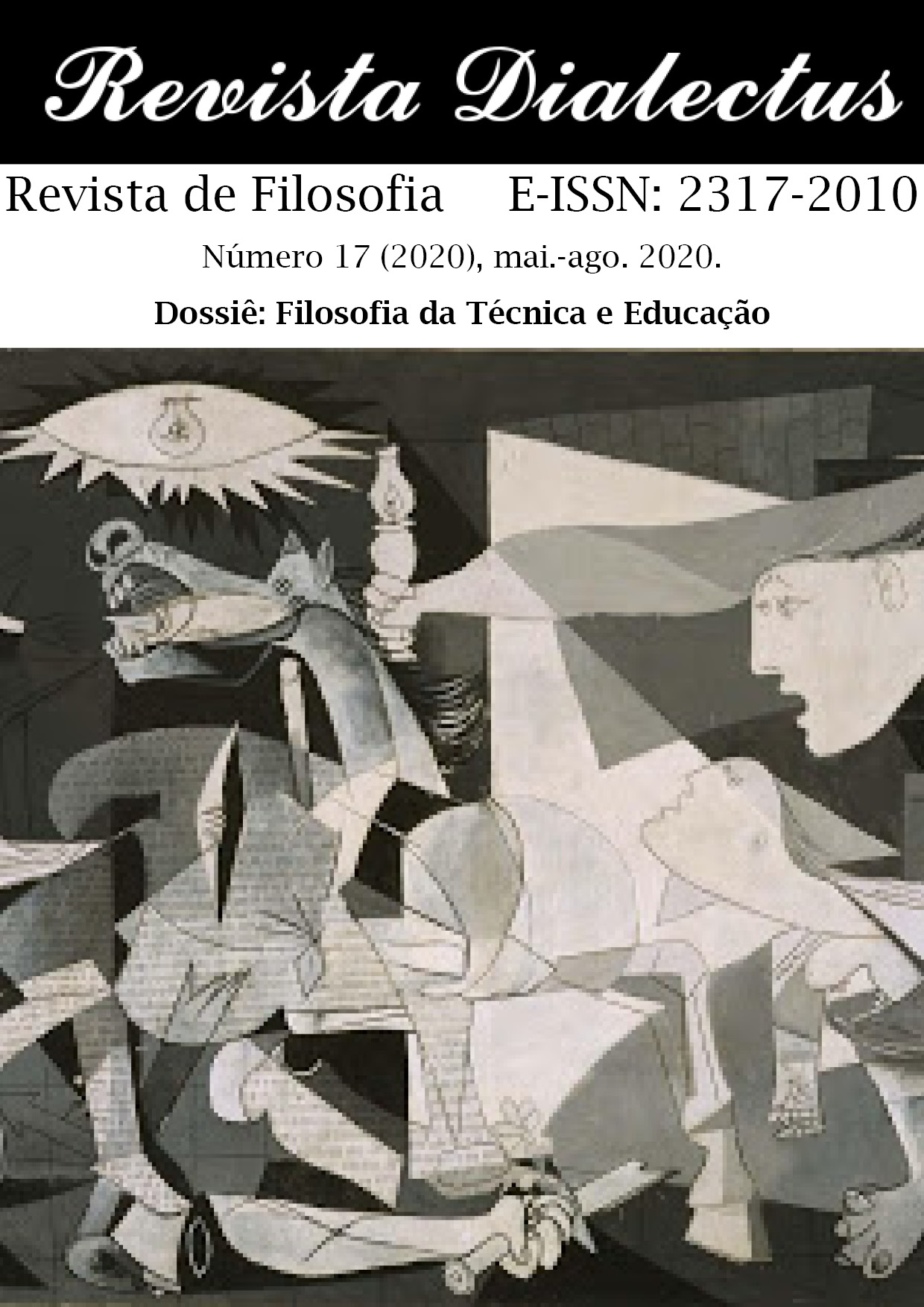MODALIDADES DA TECNOLOGIA E SUAS CONSEQUÊNCIAS CULTURAIS
DOI:
https://doi.org/10.30611/2020n17id60609Keywords:
Modalidades da tecnologia, Tecnologia como cultura, Tecnologia e educaçãoAbstract
Conforme uma distinção já habitual, a tecnologia existe em quatro modalidades: como artefatos e sistemas, como certo tipo de conhecimentos, como atividades específicas e como determinada atitude humana perante a realidade, natural ou social. Em conjunto, elas configuram nosso mundo, o mundo tecnológico. Continuando com uma análise começada em outro trabalho, exploro aqui essas modalidades no que tange às consequências que a sua proliferação tem para a cultura e a educação. Destaco efeitos como a universalização das normas e critérios técnicos, a preferência pelo artificial, a transformação da inteligência em processamento de informação e, sobretudo, o nivelamento das aspirações humanas, apontando alguns interrogantes abertos à educação.
References
BORGMANN, A. Technology and the character of contemporary life: a philosophical inquiry. Chicago: University of Chicago Press, 1984.
BOSTROM, N. Superinteligência. Caminhos, perigos e estratégias para um mundo novo. (Superintelligence: Paths, Dangers, Strategies, trad. de A.A. Monteiro e outros). Rio de Janeiro, Dark Side Books, 2018 [2014].
BRONCANO, F. Mundos artificiales: Filosofía del cambio tecnológico. México: ed. UNAM-Paidós, 2000.
BUNGE, M. Epistemologia. São Paulo: T. A. Queiroz editor, 1980.
_______. Matéria e mente. Uma investigação filosófica. (Matter and Mind: a philosophical investigation, trad. de G.K. Guinsburg). São Paulo: ed. Perspectiva, 2017.
CLARK, A. Natural-Born Cyborgs. Minds, Technologies, and the Future of Human Intelligence. New York: Oxford, 2003.
CUPANI, A. A realidade complexa da tecnologia. Cadernos IHU ideias. Ano 12, n. 216, vol. 12. São Leopoldo, RS: UNISINOS, 2014.
_______. Filosofia da Tecnologia. Um convite.3ª ed. Florianópolis, Ed. Da UFSC, 2017.
DREYFUS H.L. What computers still can´t do: a critique of artificial reason. Cambridge, Mass: The MIT Press, 1992.
FERRÉ, F. Philosophy of Technology. Athens/London, University of Georgia Press, 1995[1988].
HARARI, Y.N. 21 lições para o século 21 (21 Lessons for the 21st Century, trad. de P. Geiger). São Paulo: Companhia das Letras, 2018.
IHDE, D. Tecnologia e mundo da vida: do jardim à terra. (Technology and the lifeworld. From garden to Earth, 1990, trad.de M.F. Bozatski). Chapecó: ed. UFFS, 2017.
LEISS, W. The Domination of Nature. Montreal & Kingston: McGill-Queen´s University Press, 1994 [1972].
MITCHAM, C. Thinking through Technology. The Path between Engineering and Philosophy. Chicago/London: The University of Chicago Press, 1994.
NUSSBAUM, M. Creating Capabilities. The Human Development Approach. Cambridge/London: The Belknap Press, 2011.
ORTEGA Y GASSET, J. Meditación de la Técnica. Madrid: Espasa Calpe, 1965 (orig. 1939).
PACEY, A. The culture of technology. Cambridge, Mass.: The MIT Press, 1994 [1983].
POSTMAN, N. Technopoly: the surrender of culture to technology. New York: Vintage, 1993.
SEARLE, J. Minds, brains and programs. Behavioral and Brain Sciences, 3(3):417-424, 1980.
SEN, A. Desenvolvimento como liberdade. (Development as freedom, 1999, trad. L. T. Motta). São Paulo: Companhia das Letras, 2010.
SIMONDON, G. Du mode d´existence des objets techniques (orig. 1958). Paris: Aubier, 1989.
WINNER, L. Autonomous technology: technics-out-of-control as a theme in political thought. Cambridge: The MIT Press, 1977.
Downloads
Published
Issue
Section
License
Authors who publish in this journal agree to the following terms:
- Authors retain the copyright and grant the journal the right of first publication, with the work simultaneously licensed under the Attribution-NonCommercial-NoDerivatives 4.0 International (CC BY-NC-ND 4.0) License, which allows the non-commercial sharing of work, without modifications and with acknowledgment of authorship and initial publication in this journal.
- Authors are authorized to take additional contracts separately, for non-exclusive distribution of the version of the work published in this journal (eg publish in institutional repository or as a book chapter), with acknowledgment of authorship and initial publication in this journal.
- Authors are allowed and encouraged to publish and distribute their work online (eg in institutional repositories or on their personal page) at any point before or during the editorial process, as this can generate productive changes as well as increase the impact and citation of published work (See The Free Access Effect).



















